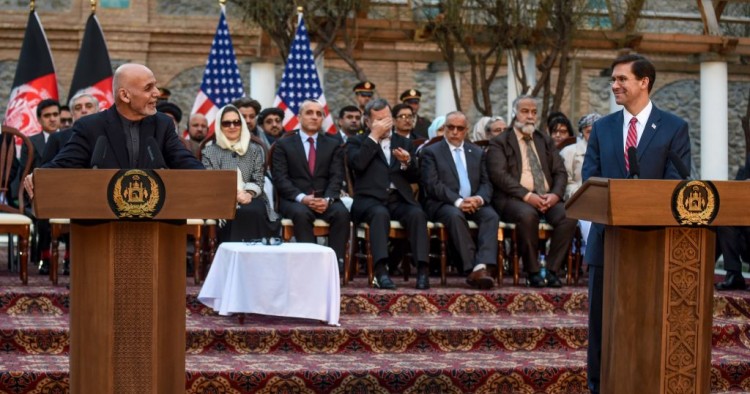This week's briefing on recent news and upcoming events in the region featuring Marvin G. Weinbaum, Alex Vatanka, Dima M. Toukan, and Syed Mohammad Ali.
The myth of US conditionality in Afghanistan
Marvin G. Weinbaum
Director for Afghanistan and Pakistan Studies

In a hard-negotiated Feb. 29 agreement with the Taliban the U.S. committed to a withdrawal of U.S. forces by May 2021. To allay criticism of the deal, American negotiators gave assurances that the departure of American troops from Afghanistan was in fact “conditions based.” The Taliban was expected to live up to the terms of an agreement understood to require it sever all ties to al-Qaeda, meaningfully reduce the level of violence, and immediately embark on intra-Afghan peace talks. Aside from keeping its word not to directly target departing American forces, the Taliban has defied the U.S. on almost every account. Taliban connections to al-Qaeda remain alive and well, little letup has occurred in its armed attacks, and progress toward commencing substantive negotiations has encounter repeated roadblocks created by intransigent Taliban demands.
Meanwhile, the U.S. has recently reduced its troop levels in Afghanistan to 8,400 and has been slated shortly to cut the number to 4,000 and to 2,500 by early next year. But then last Wednesday President Donald Trump abruptly announced his intention to bring home all remaining American troops in Afghanistan by Christmas, an action not warranted by conditions across the country but prompted by the exigencies of the U.S. presidential campaign. American diplomatic and military leaders have deplored the high levels of Taliban violence but only with vague, unconvincing threats of possible consequences. A once prioritized U.S. policy calling for an early cease-fire has been replaced by U.S. peace envoy Zalmay Khalilzad’s willingness to now accede to the Taliban’s putting off consideration of a cease-fire until all outstanding issues to be negotiated are resolved.
A December departure of U.S. troops would not bode well for the course of the peace talks or the war. It may also preempt retention in Afghanistan of a small counter-terrorism force as is believed preferred by the Democratic presidential candidate, Joe Biden. Senior American military officials were clearly rattled by Trump’s tweeted pronouncement, and the Ghani administration did its best to hide its shock. To no one’s surprise, the Taliban applauded the move. Without a U.S. military presence, the Kabul government’s already poor negotiating hand will be further weakened, and the regime left susceptible to bullying by the Taliban. On the battlefield, the somewhat improved capability and morale of the Afghan security forces are bound to suffer, especially after a complete withdrawal of U.S. air power. Lost in all these developments is any pretense of American actions being conditions based.
This article was co-authored by Hamid Safi, Jack Stewart, and Ghasharib Shoukat, research assistants to Marvin G. Weinbaum.
China’s leverage over Iran and Middle East dialogue
Alex Vatanka
Director of Iran Program and Senior Fellow, Frontier Europe Initiative

On Oct. 9, Iranian Foreign Minister Javad Zarif arrived in China to meet his counterpart, Wang Yi. According to Tehran, Zarif’s agenda was focused on negotiating the recently announced 25-year, $400 billion strategic agreement that is touted as a quantum leap forward in relations. Tehran is hoping to finalize this deal by 2021, which coincides with the 50th anniversary of the establishment of diplomatic ties between the two countries. The Trump administration’s relentless “maximum pressure” campaign against Iran is only pushing Tehran and Beijing closer together. Zarif arrived in China a day after Washington imposed more sanctions on Iran, which Tehran lambasted as aimed at choking its trade in food and medicines.
The Iranians openly laud China as the savior that can help them overcome American pressure. On Zarif’s wish-list was to look for ways to increase trade with China, which has been declining. Still, while both Iran and China are in President Donald Trump’s line of fire and share a dislike of American unilateralism, any notion that Beijing can offer Tehran a magic bullet to overcome its international isolation is vastly exaggerated. In the Middle East, where Iran’s regional agenda is most contentious, the Chinese happen to pursue closer relations across the board. For Iran to expect China to pick its side in its regional squabbles with the likes of Saudi Arabia, the UAE, or Israel, is to misread Beijing.
China might one day want to supplant the U.S. in the Middle East as the principal extra-territorial power, but we are not there yet. In the meantime, what the Chinese can do is to play the role of a facilitator for dialogue among the countries of the Middle East. During Zarif’s visit, Foreign Minister Wang called for a “a regional multilateral dialogue platform with equal participation of all stakeholders.” This proposal, if serious, is not only aimed at elevating China’s role in the Middle East but also at sidelining the U.S. China’s condition for countries to join such a regional dialogue mechanism is to support the 2015 Iran nuclear deal, which the Trump administration abandoned in 2018.
Plenty of challenges ahead for Jordan’s new prime minister
Dima M. Toukan
Non-Resident Scholar

King Abdullah has appointed former advisor Dr. Bisher al-Khasawneh as Jordan’s new prime minister as the country prepares for the upcoming parliamentary election on Nov. 10. Formally sworn in on Oct. 12, the new government, in which women’s representation has fallen to just 9 percent, inherits the same systemic challenges of previous governments in addition to a feverish economy with weak prospects for growth and climbing unemployment.
The new prime minister arrives amid low levels of public trust in the government, which is widely regarded as having imposed erratic measures to curb the pandemic only to recently appear to lose the battle against it. Back in March, the former government swiftly imposed a preventative national lockdown that secured an impressively low rate of infections for months. Fast forward to October, however, and the country is now witnessing an uncontrollable surge in cases, amid fears that the health sector could collapse if the spread of the pandemic continues on the current trajectory.
With no flair for selling unpopular COVID-related decisions, the government was blamed by citizens for imposing measures that compromised their livelihoods. In a recent survey conducted by the Center for Strategic Studies, the majority of Jordanians said the country is heading in the wrong direction and 57 percent said the government was not successful in managing the pandemic. Frustrations over overall conditions and the pandemic itself are expected to dampen enthusiasm for the upcoming election and could tarnish the legitimacy of the new legislature, already seen as toothless. According to election monitor RASED, only 28 percent of Jordanian youth said they intend to vote in November.
Beyond local challenges, the new prime minister will need to deftly manage the relationship with the U.S. in light of new Arab-Israeli dynamics, balancing regional interests against national ones largely defined by economic and demographic realities. Jordan has always been good at maintaining this balancing act. The new government will buy time and boost short-term resilience but is not expected to make any significant policy changes. With a spike in COVID cases, mounting pressure on the country’s health sector and economy, and changing regional realities that could affect Jordan’s long-standing geostrategic position, Khasawneh’s plate is already full.
Pakistan needs a more nuanced China policy
Syed Mohammad Ali
Non-resident Scholar

China is hailing a vindication of its stance on Hong Kong and its handling of the Uighur situation due to the support it has mustered at this year’s U.N. General Assembly. Seventy countries have endorsed China’s position on these issues, as opposed to its condemnation by almost 40, mostly Western countries.
We live in a world where realpolitik considerations readily trump more idealistic or moralistic aspirations. However, even from a pragmatic perspective, countries blindly endorsing China’s position due to their growing relationship with this global power need to exercise more caution. No other nation needs to think through the implications of supporting Chinese aggression in Hong Kong or Xinjiang more than Pakistan.
The ideologically divergent Communist People’s Republic of China and the Islamic Republic of Pakistan have enjoyed an unlikely “all-weather” friendship, underpinned in part by the mutual hostility both countries have felt toward India. Unlike its turbulent relationship with the U.S., Pakistan has been able to count on China for consistent security cooperation as well as diplomatic support. Pakistan’s relationship with China got a big boost when the $62 billion China-Pakistan Economic Corridor (CPEC) was launched in 2015 to become the flagship project of the larger Belt and Road Initiative.
While the opacity and top-heavy way CPEC is being implemented remains an issue of concern, Pakistan is heavily reliant on Chinese investments to meet its infrastructure and energy needs. Pakistan continues to brush aside American warnings about falling prey to Chinese debt diplomacy. Pakistan has however been compelled to deepen its embrace of China due to its growing estrangement with the U.S., and the American decision to bolster relations with India to counterbalance China.
The U.S. is criticized for having double standards in condemning Chinese repression of Muslims in Xinjiang and its highhandedness in Hong Kong while not paying much heed to India’s treatment of its Muslims or its actions in the disputed territories of Kashmir. Yet, Pakistan is also undermining its own credibility when it decries Indian actions in Kashmir while endorsing Chinese high handedness in Hong Kong. Similarly, Pakistan is very vocal about the mistreatment of Muslims in India and the West, but it remains silent about the treatment of Uighur Muslims in China. Growing economic ties do not mean that Pakistan must support Chinese transgressions, especially when Pakistan is trying so hard to evoke international condemnation of India for these same transgressions.
Photo by WAKIL KOHSAR/AFP via Getty Images
The Middle East Institute (MEI) is an independent, non-partisan, non-for-profit, educational organization. It does not engage in advocacy and its scholars’ opinions are their own. MEI welcomes financial donations, but retains sole editorial control over its work and its publications reflect only the authors’ views. For a listing of MEI donors, please click here.













